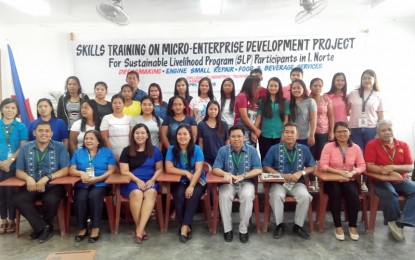
FIRST BATCH. The first batch of trainees who successfully completed various livelihood skills with trainors from MMSU. (Photo by Reynaldo Andres)
BATAC CITY-- More than 310 beneficiaries of the Pantawid Pamilya Pilipino Program (4Ps) in Ilocos Norte are currently undergoing various livelihood trainings courtesy of the state-run Mariano Marcos State University here.
Since April, there were 105 being trained on how to repair small vehicle engines, dressmaking, and food and beverage services.
There is also an ongoing training on raising small ruminants such as goat and sheep. The trainings are expected to end on May 25.
Held at the MMSU College of Industrial Technology, the series of trainings through the DSWD’s Sustainable Livelihood Program (SLP) hopes to empower the poorest of the poor in the province and make use of their new knowledge and skills to become more productive.
Bella Gervacio, MMSU’s chief for Training and Continuing Education, on Thursday said these livelihood skills when properly acquired and put into practice could help the beneficiaries get job, increase their income and help their families.
SLP is a capacity-building program for the poor, vulnerable and marginalized families, and individuals so that they would acquire skills to help them start a small business, and maintain thriving livelihoods that help improve their socio-economic conditions.
Gervacio said each beneficiary chose one livelihood skill based on his interest and commitment in applying them after the training.
“After the training, the beneficiaries will undergo a National Certificate (NC) II assessment by the Technical Education, Skills and Development Authority (TESDA) for possible employment,” Gervacio said.
As a jumpstart capital, the DSWD will also distribute goats and sheep to help them start a profitable backyard livestock enterprise.
She said that those who could not meet the competency standards needed in getting an NC II can still apply their skills at home or at any business establishment they want to work with.
After the training, the participants will also be assisted in registering their micro-enterprise operation, especially on establishing linkage with other institutions and organizations that can provide them additional support.
The livelihood skills training came in full swing after MMSU President Shirley C. Agrupis and DSWD Regional Director Marcelo Nicomedes J. Castillo agreed to implement the SLP in Ilocos Norte through a memorandum of agreement signed last December 2017. (PNA)
